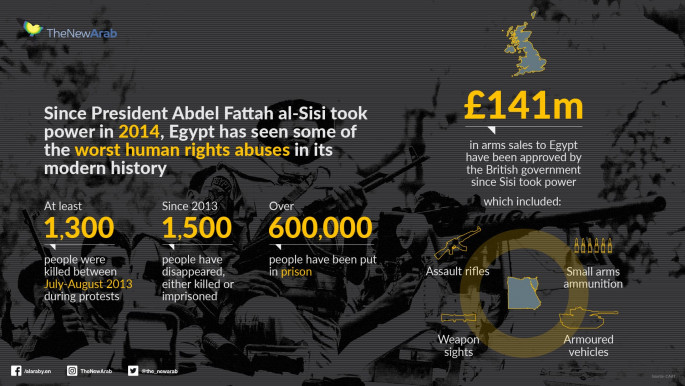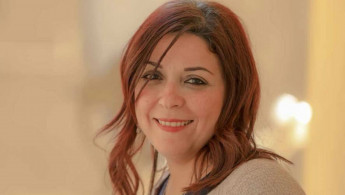Prominent Egyptian activist Esraa Abdel Fattah 'abducted' by security forces: reports
Egypt has detained two prominent activists who played key roles in the 2011 revolution, activists and a rights group said, the latest in a wave of arrests in recent weeks.
Blogger and journalist Esraa Abdel Fattah, 41, was detained on Saturday evening, a fellow activist said.
Mohamed Salah wrote on his Facebook page that shortly after meeting Abdel Fattah "two cars full of plainclothes police officers took her in one car and me in another."
He added: "They left me after an hour on the highway after they blindfolded and beat me."
Abdel Fattah is best known for co-founding the 6th of April movement in 2008.
The youth movement was instrumental in mobilising millions of Egyptians in the uprising that toppled long-time autocrat Hosni Mubarak in 2011.
Abdel Fattah's whereabouts is currently unknown, according to local watchdog group, the Egyptian Commission for Rights and Freedom.
Abdallah Said, another political activist and official with the opposition Bread and Freedom party, was also detained from his home early on Sunday, according to a note posted by his party on social media.
Other officials from the leftist party have also been rounded up in recent weeks.
In the last three weeks, authorities have detained about 3,000 people, including well-known academics, activists and lawyers, according to rights groups.
Activists say the crackdown is one of the worst since President Abdel Fattah al-Sisi took power in 2014.
While some detainees have been released, no high-profile figures have been freed, according to a list maintained by rights monitors.
On Saturday, Britain's Edinburgh University urged all of its students in Cairo to return home after two were arrested by Egyptian authorities.
The university says two of its students studying in the city were recently detained and subsequently released by Egyptian authorities.
The university's press office said in a statement that the university had concerns for the safety and well-being of its remaining nine students and urged them to return home, The Associated Press reported.
Twitter Post
|
"We have a responsibility to act in the best interests of our students and to take decisive action when there are concerns for their safety and wellbeing," a spokesman for the university said.
Just a day earlier, Egyptian authorities detained Italian journalist Francesca Borri at Cairo International Airport shortly after arriving from Italy, according to media reports.
"They [Egyptian authorities] are running some checks. She was blocked inside due to some verifications on her passport due to a stamp from a country they are investigating," Antonio Decaro, the mayor of the journalist's hometown of Bari, told Italian media.
"We hope that in a couple of hours everything will be resolved," he added.
Read more: Palacegate: Mohamed Ali calls on Egyptians to protest from their rooftops
Decaro said that an official from the Italian consulate in Cairo was with the journalist inside the room where she was being held.
The Italian embassy in Egypt said they are following the case closely.
Diplomatic sources told RaiNews that the Italian consul had headed to the airport to assist Borri.
Meanwhile, the family of Egyptian pro-democracy activist Alaa Abdel Fattah said he was beaten, threatened and stripped to his underwear after being arrested during the recent clampdown on recent anti-government protests.
Abdel Fattah told his lawyers that since his arrest, he was subjected to several violations including being blindfolded, insulted, slapped, kicked and threatened never to be released from Cairo's most notorious prisons, where he is being held, a statement from his family read.
Mona Seif, Abdel Fattah's sister, told The Associated Press that he had filed a legal complaint about all the alleged abuses with the State Security prosecutors during a hearing on Wednesday to renew his pre-trial detention.
 |
His family fears the retaliation of prison authorities.
"By returning to the same prison with the same people who threatened him, we are worried that he might face more violations and more torture," said Seif, a staunch human rights advocate.
Abdel Fattah was released in March, after five years in prison for taking part in a peaceful protest against military trials of civilians.
To many, his imprisonment after al-Sisi rose to power - at a time when authorities imposed draconian laws banning public gatherings and unauthorized demonstrations - was another sign of Egypt's return to autocratic rule.
Read more: #25Jan: Ten big names during the 2011 Revolution
He was arrested last month from a Cairo police station, where he was required to check in every night under the legal terms of his release.
This time, Abdel Fattah is facing several charges, including belonging to a terrorist organisation and using the social media to spread false news that could threaten national security, said his sister.
The sweeping arrests came after rare protests in September called for the removal of Sisi, in defiance of a ban on demonstrations.
Mohamed Ali, who fled Egypt to Spain earlier this year, ignited a protest movement in Egypt last month, when he revealed that President Sisi had contracted his company to build several luxurious palaces using public money while the government enforced tough austerity measures on the public.
The scandal has been dubbed "Palacegate". Sisi acknowledged that he had been building palaces but said he was building them for the Egyptian state rather than himself.
Egypt passed a restrictive anti-protest law in 2013 after Sisi led the military ouster of Islamist president Mohamed Morsi. A renewable state of emergency also remains in force.
Last week, parliamentary speaker Ali Abdel Aal said: "There is not a single political prisoner in Egyptian jails".
And in parliament, Prime Minister Mostafa Madbouli praised how authorities handled the protests saying, "we haven't heard of any breaches".
| Article continues below interactive timeline |
| |
Follow us on Twitter: @The_NewArab





 Follow the Middle East's top stories in English at The New Arab on Google News
Follow the Middle East's top stories in English at The New Arab on Google News
![The UAE is widely suspected of arming the RSF militia [Getty]](/sites/default/files/styles/image_330x185/public/2024-11/GettyImages-472529908.jpg?h=69f2b9d0&itok=Yauw3YTG)
![Netanyahu furiously denounced the ICC [Getty]](/sites/default/files/styles/image_330x185/public/2024-11/GettyImages-2169352575.jpg?h=199d8c1f&itok=-vRiruf5)
![Both Hamas and the Palestinian Authority welcomed the ICC arrest warrants [Getty]](/sites/default/files/styles/image_330x185/public/2024-11/GettyImages-2178351173.jpg?h=199d8c1f&itok=TV858iVg)